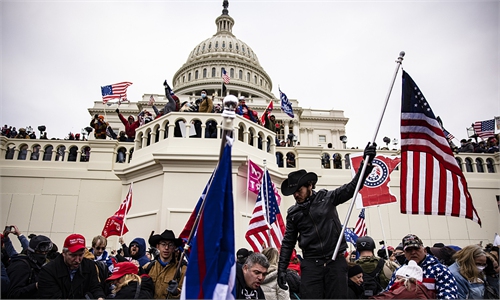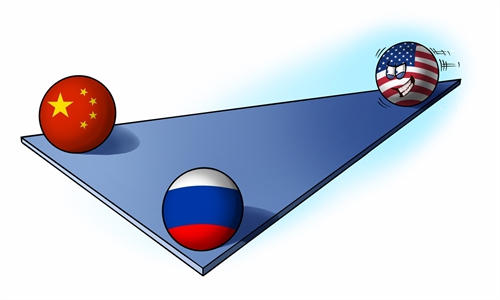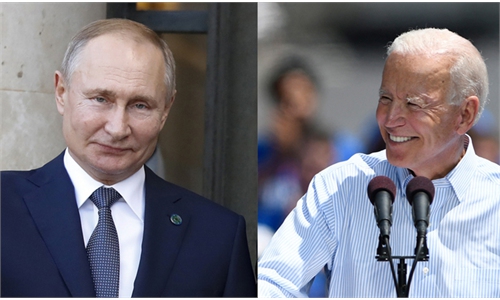Moscow, Beijing reaffirm close ties before Putin-Biden summit in Geneva
Attempts to split China-Russia relations ‘useless, hilarious’: expert
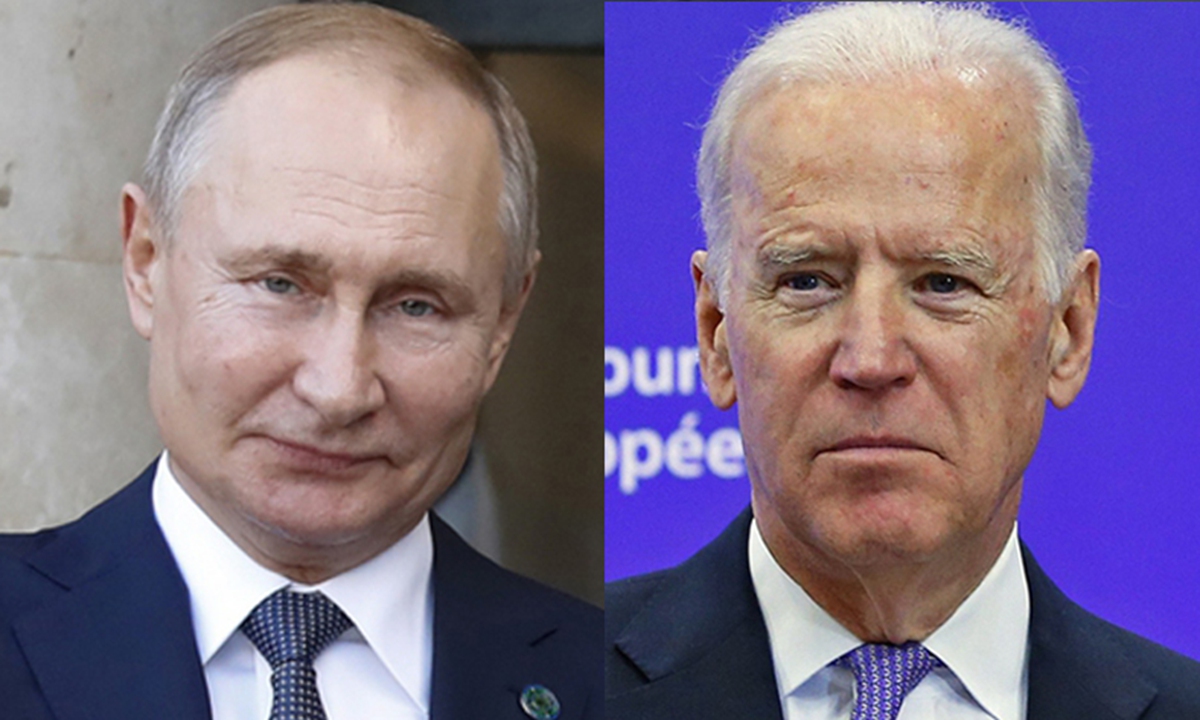
Xinhua file photos of Russian President Vladimir Putin (L) and US President Joe Biden (R)
Russian President Vladimir Putin and his US counterpart Joe Biden both downplayed expectations on their upcoming meeting on Wednesday, and Chinese experts said the biggest expectation for Biden in the meeting in Geneva is to stabilize US-Russia relations and split China-Russia ties as much as he could, but this won't work anyway.
The topic of China seems unavoidable throughout Biden's recent trip in Europe, and observers have summarized a mission list for the US president: to make the West looks united; to declare the return of the US; to engage with Putin for easing tensions so that the US could focus on competition with China. However, world leaders also have questions for Biden: America is back, but for how long? Why should they follow the order of a superpower that lacks consistency and certainty?
On the contrary, China and Russia's politics has much more certainty and consistency. In NBC News' exclusive interview on Friday, Russian President Putin said that "we have developed a strategic partnership relationship- between Russia and China that previously had not been achieved in the history of our nations, a high level of trust and cooperation in all areas: in politics, in the economy, in the area of technology..."
Chinese Foreign Ministry spokesman Zhao Lijian said at Tuesday's press conference that "We highly appreciate President Putin's positive remarks on China-Russia relations. Indeed, China and Russia are united like a mountain, and our friendship is unbreakable," and "Sky is the limit for down-to-earth China-Russia cooperation, and we are full of confidence in the development of bilateral relations."
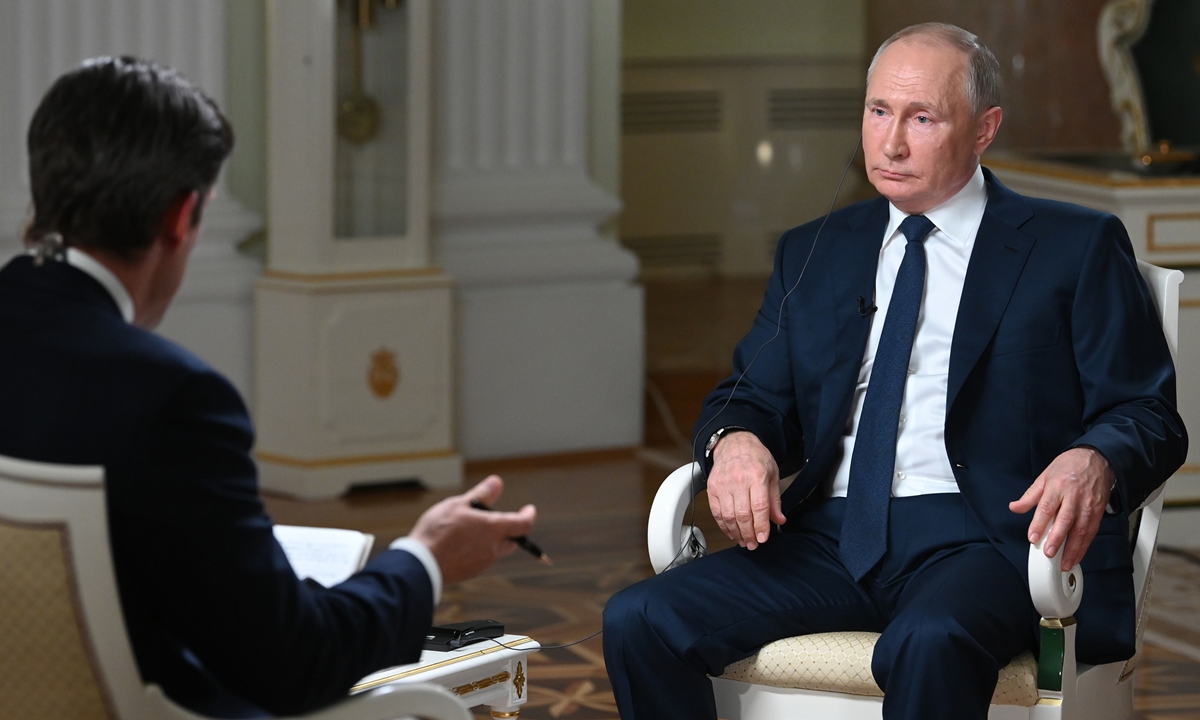
Russian President Vladimir Putin gives an interview to NBC at the Kremlin in Moscow on Monday (Russian time). Over the last few years, China and Russia have developed a strategic partnership relationship that previously had not been achieved in history, a high level of trust and cooperation in all areas, Putin said in response to questions about China. Photo: VCG
Putin's wisdom
In its exclusive interview with Putin, NBC News devoted much of it on questions about China, and Keir Simmons tried to make Putin at least say a few bad things about China, but failed.
The questions from Simmons covered the "potential threat" of China's rising military strength toward Russia, China's absence from the US-Russia nuclear arms control negotiations, China's Xinjiang affairs, Russia's cooperation in the space program with China and the US, and even the hypothetical question like what would Russia do if China solves the Taiwan question militarily.
Simmons said "China, for example, abstained on Crimea at the Security Council. China's biggest banks have not contravened American sanctions against Russia. Do you think you get 100 percent support from China?"
Putin responded, according to NBC, "Can I be completely honest? We can see attempts at destroying the relationship between Russia and China. We can see that those attempts are being made in practical policies. And your questions, too, have to do with it."
Such attempts made by Simmons, as well as US policymakers, look extremely hilarious, useless and too obvious, said Chinese analysts.
Lü Xiang, a research fellow in US studies at the Chinese Academy of Social Sciences in Beijing, told the Global Times that "Biden knows that kind of attempt won't work but he will try his best. This is the biggest goal that he wants to reach from the meeting with Putin."
The US has nothing to offer Russia, to let Moscow abandon all it got from relations with Beijing and take the risk of betraying China, while Russians have a very unfortunate and painful memory of being betrayed and fooled by the US, said experts.
Jin Canrong, associate dean of the School of International Studies at the Renmin University of China, said there is no chance for the US to entirely change the direction of US-Russia relations from confrontation to cooperation. The most Biden could get is to slow down the worsening trend.
"Since Obama's term, every time a new president moves in the White House, the US always tries to reset ties with Russia, but they eventually fall into confrontation. This proves that US-Russia ties have deep structural conflicts," Jin said.
Alexander Lukin, a professor at MGIMO-University of the Russian Foreign Ministry, told the Global Times that "I wouldn't say that this discussion (Putin-Biden meeting) can improve fundamentally the (Russia-US) relations, because it's still very difficult for Americans to do it for domestic reasons. If they do too much, they will be criticized by the opposition which is now represented by the Republican Party."
"As the structural conflicts between Russia and US are being intensified in recent years, the meeting may reach some consensus on non-principle questions, but will not exert great influence to promote bilateral relations," Li Xing, director of the Eurasian Studies Center and the Center for International Relations with the School of History at Beijing Normal University, told the Global Times on Tuesday.
Those structural contradictions, for example on geopolitics, human rights and arms control, cannot be addressed easily as the world has already seen that Russia-US relations did not get any better despite the change in US governments, Li noted.
In response to NBC's questions, Putin also said "we (China and Russia) are neighboring countries. One does not choose one's neighbors. We are pleased with the unprecedentedly high level of our relationship as it has evolved over the last few decades, and we cherish it, just like our Chinese friends cherish it, which we can see."
Zhao said on Tuesday that the new era of comprehensive strategic partnership between China and Russia is omnidirectional with no caps. He stressed that any attempt to undermine relations between China and Russia are doomed.
One day ahead of the Putin-Biden meeting, Tuesday is the birthday of Chinese President Xi Jinping, and two years ago, Xi celebrated his birthday with Putin, and Putin presented Russian ice cream as a gift. In recent year, under the intense scrutiny from the US, the two leaders' relations are getting increasingly closer.
This kind of solid and close personal relationship between the top leaders is based on high-level mutual trust, similar values and broad common interests shared by the two major powers, unlike the fragile unity between the US and its allies. So China is not anxious about Biden's diplomatic efforts at all, said analysts.
Russian Ambassador Andrey Denisov said in an exclusive interview with the Global Times that Russia will keep close communication with China on the summit with the US.
While asked that some analysts suggest the Biden administration may take measures to ease tensions with Russia in order to concentrate on dealing with China, will this strategy alienate Russia from China and draw it closer to the US? Denisov said "This view is too short-sighted. It can't happen. I think we're smarter than what the Americans think."
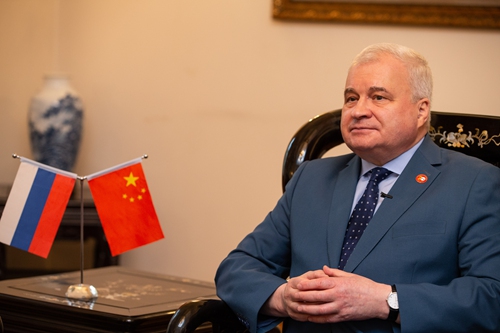
Russian Ambassador to China Andrey Denisov Photo: Li Hao/GT
Similar feeling
When the US is trying to sow discord in China-Russia ties, Moscow and Beijing are showing their sense of humor while commenting on the US.
Zhao on Tuesday criticized the G7 communiqué, which interferes in China's domestic affairs. He said "the time for a country or a bloc consists of some countries to control the world has long gone…the US is ill, and the illness is serious. The G7 should find the cure for the US."
Putin also said, "'Don't be mad at the mirror if you are ugly.' It has nothing to do with you personally. But if somebody blames us for something, what I say is, 'Why don't you look at yourselves?' You will see yourselves in the mirror, not us."
Unfortunately, the US loves to use its hegemonic position to pressure countries like China and Russia, who are highly serious about autonomy and sovereignty, and even its European allies are also tired of this outdated approach, experts noted.
Jin said it seems like China and Russia, maybe a lot of countries around the globe, share the same feeling - the US is a patient with a problematic mindset. "He feels the pain and he knows he's ill, but he doesn't want to go to the hospital and find out the real reason of the illness. He likes to be mad at the people around him. We used to think this is just the problem of the Trump administration, but now it seems like this is a problem for all of them."
Lü said it's not just China and Russia, major powers in the EU also have their concerns, and that's why they are keeping a distance from the US demand, and remain independent in decision-making on ties with China and Russia.
"Biden declared that America is back, but for how long? This is the question that he failed to answer his allies. Everyone can see the US is dividing, not just between Democrats and Republicans, but also within Democrats. Who will closely follow a country with such uncertainty?"


